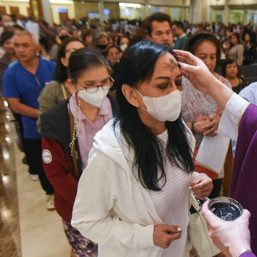SUMMARY
This is AI generated summarization, which may have errors. For context, always refer to the full article.
![[OPINION] Love in the time of climate anxiety](https://www.rappler.com/tachyon/2023/02/20230214-love-time-climate-anxiety.jpg)
Do you feel like time is running out?
Do you feel that your future is never going to be rosy and bright?
Are you afraid that you will never find what you’re looking for?
No, this is not about the struggles of finding the love of your life or mine. This is about a phenomenon that many young people are experiencing more these days.
They say, “Every disaster movie begins with a scientist being ignored,” which is of course rooted in reality. After all, who wants to constantly see news articles and social media posts about a global problem likely to become even worse years from now? Nobody likes a Debbie Downer when it should be just all about #positivevibes, right?
You have to admit, watching shows or films depicting some catastrophic calamity may be visually impressive, but they will make you wonder how to react if it was happening right in front of you.
Hearing about how a typhoon, heat wave, or flash flood inflicted record-breaking impacts on an entire country or community can induce a sense of fear and dread. Experiencing them first-hand would certainly make those feelings worse, in addition to any disruptions to day-to-day living caused by the ensuing damage.
If you find yourself going through any of this, the odds are you are experiencing what is known as climate anxiety. While experts argue about the official definition, their interpretations are all linked to various forms of psychological distress triggered by the climate crisis directly (through extreme weather events), indirectly (through the effects on social and economic activities), or via awareness of these events.
In the Philippines, many from younger generations may be experiencing distressing thoughts and emotions regarding the climate crisis. A recent survey found that 84% of Filipino youth said they were “very worried” or “extremely worried” about this threat, which may have had an impact on their daily lives. Most of the surveyed youth reported sadness, anxiety, helplessness, and anger related to said crisis.
A vast majority also have negative outlooks about their future, including how “people have failed to take care of the planet,” “humanity is doomed,” or “the future is frightening.” Others also view it as threat to the security of their families or something that would destroy the things they value the most.
This is not a surprising development, as the Philippines is among the developing countries that are the most exposed and vulnerable to the impacts of the climate crisis. Within nations, the most vulnerable sectors and communities (i.e., youth, women, indigenous peoples) are more likely to be hit harder compared to others.
For example, the mental health impacts that survivors of 2013 Super Typhoon Yolanda would differ from those who saw it on newsreels or videos posted on social media. A year after said disaster, an estimated 800,000 people in Eastern Visayas were reported to be suffering from conditions such as anxiety, depression, and post-traumatic stress disorder. Some of them may still be enduring these effects to this day, especially if reminded of this calamity.
‘I choose you’
While sounding like a harbinger of doom should be avoided as much as possible, the reality in which we find ourselves cannot be ignored. Based on current projections, without the right solutions, global temperatures will increase and so would the impacts on all facets of life that we have either experienced ourselves or been exposed to. With that comes potentially more people being prone to climate anxiety.
From the perspective of an ecological advocate who constantly deals with this issue for years, there certainly are some actions you can take to deal with it.
One, join the global and local calls for climate justice and action. While this may initially sound counterproductive for those looking to reduce their exposure, it is about taking a more proactive approach to facing potential impacts and preventing other people from having to go through similar experiences.
Two, talk about your relevant thoughts and emotions to people with whom you are most comfortable. Sometimes, a good conversation or two with someone willing to listen is all it takes to relieve your stress. Along the way, you might discover new ways to cope and eco-friendly good practices.
Three, engage in more outdoor activities. Immersing yourself in green parks, visiting the seaside or mountains, or joining tree-planting and growing activities might provide some needed comfort and appreciation for the wonders that still exist in our world. Growing your own food through small-scale gardening or even one pot also helps in reconnecting with nature, among other benefits.
Four, adopt more eco-friendly lifestyles and activities. These include having a healthier diet, making your home more energy-efficient, educating your loved ones, or participating in a community project to deal with a local impact.
While it is never preferred to feel anxious or anything similar, there is a silver lining: being aware of the gravity of what awaits us. It means there is an understanding of the need for urgent, inclusive, and effective actions against the gravest threat of our lifetime.
In short, climate action is as impactful of a way as any for us to show love for the ones we care about, for our common home, and for that desired future that still awaits us.
After all, love is a choice. – Rappler.com
John Leo Algo is the Deputy Executive Director for Programs and Campaigns of Living Laudato Si’ Philippines and a member of Aksyon Klima Pilipinas and the Youth Advisory Group for Environmental and Climate Justice under the UNDP in Asia and the Pacific. He is a climate and environment journalist since 2016.
Add a comment
How does this make you feel?
![[PODCAST] The Green Report: How movements build hope for climate change](https://www.rappler.com/tachyon/2023/01/The-Green-Report-TC.jpg?fit=449%2C449)




![[FIRST PERSON] Celebrating Valentine’s Day as a polyamorous person](https://www.rappler.com/tachyon/2024/02/ispeak-valentines.jpg?resize=257%2C257&crop=414px%2C0px%2C1080px%2C1080px)
There are no comments yet. Add your comment to start the conversation.